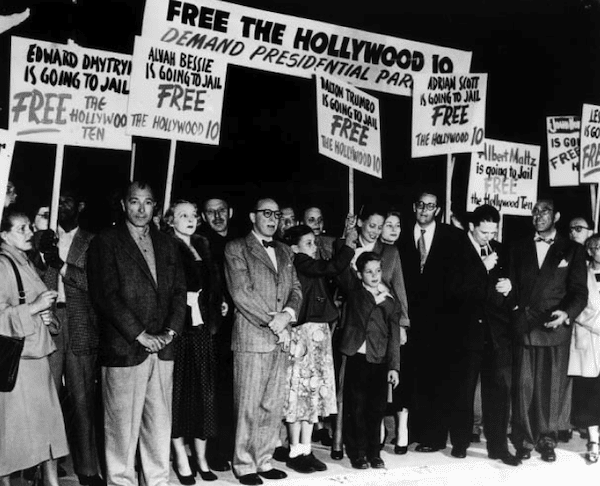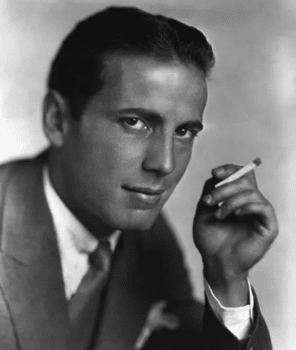
Humphrey Bogart [Source: stuffnobodycaresabout.com]
We saw it—and said to ourselves, ‘It can happen here.’ We saw American citizens denied the right to speak by elected representatives of the people! We saw police take citizens from the stand like criminals, after they’d been refused the right to defend themselves. We saw the gavel of the Committee Chairman cutting off the words of free Americans. The sound of that gavel, Mr. Thomas, rings across America, because every time your gavel struck it hit the First Amendment to the Constitution of the United States.
Bogie asserted this in a “Hollywood Fights Back!” radio program in 1947, which is heard in Judy Chaikin’s 1987 documentary Legacy of the Hollywood Blacklist, screened 75-ish years later on March 26, 2023, at the Hollywood Heritage Museum as part of a program of the same name. The Emmy Award-nominated non-fiction film is narrated by Burt Lancaster, who had also participated in the “Hollywood Fights Back!” broadcasts, organized by the Committee for the First Amendment, composed of La-La-Land leftists and liberals who opposed the Blacklist.
Chaikin’s 60-minute documentary chronicles the motion picture purge, when hundreds of talents were subpoenaed by the House Committee on Un-American Activities (HUAC) to testify about subversion and Communist infiltration in Tinseltown. (Some artists—including Maltese Falcon author Dashiell Hammett, poet Langston Hughes, folksinger Pete Seeger and Spartacus author Howard Fast—were also summoned to appear before Senator Joe McCarthy’s Senate Permanent Subcommittee on Investigations.)
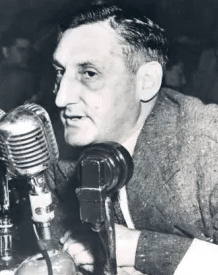
John Howard Lawson [Source: usefulstooges.com]
Are you now or have you ever been a member of the Communist Party?
Standing on their First Amendment right, the Ten believed this prying into personal affiliations was unconstitutional governmental meddling. In particular, the filmmakers were concerned that, if they answered the Committee’s inquiries about themselves, they would then open themselves to being asked about the associations of friends and colleagues.
But the Hollywood Ten’s refusal to be quislings to HUAC’s quizzes, in sometimes testy testimony broadcast coast-to-coast on live radio, came at a high price. The Ten were charged with contempt of court and they were all forced to pay fines and serve up to a year behind bars in the land of the free. In addition to their imprisonment, movie moguls announced studios would not employ “Communists,” who were banned from working in the motion picture industry.
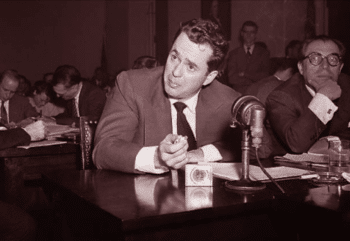
Larry Parks testifies before HUAC. [Source: oldmagazinearticles.com]
Chaikin’s excellent Legacy of the Hollywood Blacklist chronicles all this, mainly from the point of view of the wives and children of the persecuted talents who paid such steep prices for not becoming informers. After the screening of the documentary at the Hollywood Heritage Museum, board member Julie Fleischer, who produced the event and is a script supervisor of TV shows including Will & Grace, The Big Bang Theory and Paramount’s Frasier reboot, moderated a panel that included Chaikin and some of her film’s interviewees and other children of blacklisted artists. They included:
Becca Wilson, daughter of Oscar-winning screenwriter Michael Wilson (who was denied screen credits for co-writing 1957’s The Bridge on the River Kwai and 1962’s Lawrence of Arabia); Vicki Crawford, daughter of Oliver Crawford (who wrote Star Trek); Michael Collins, son of screenwriter Richard Collins (who co-wrote 1944’s Song of Russia and named 26 names in his HUAC testimony) and actor Dorothy Comingore (who co-starred in 1941’s Citizen Kane and would not inform to HUAC). The panelists recounted the toll that persecution took on their families. Becca remembered watching a movie her father wrote at a theater and how he cried at the end when the credits rolled—because his name was omitted.
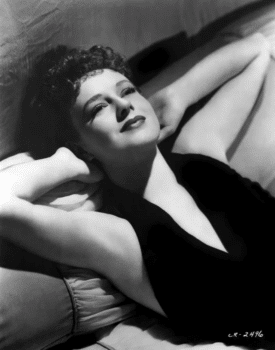
Dorothy Comingore [Source: wikipedia.org]
Located across from the legendary Hollywood Bowl, in a barn converted into a movie studio by Cecil B. DeMille to shoot a Western in 1914, what is now the Hollywood Heritage Museum is a reliquary of artifacts from the days of silent movies and Hollywood’s golden age, a veritable shrine to La-La-Land lore and moving picture pioneers. But Becca Wilson warned that the Blacklist, which started three-quarters of a century ago, is not just ancient history. Striking a cautionary note, Becca quoted from her father’s 1976 acceptance speech for the Writers Guild of America’s Laurel Award:
“I feel that unless you remember this dark epoch and understand it, you may be doomed to replay it. Not with the same cast of characters, of course, or on the same issues. But I see a day perhaps coming in your lifetime, if not in mine, when a new crisis of belief will grip this republic; when diversity of opinion will be labeled disloyalty; and when extraordinary pressures will be put on writers in the mass media to conform to administration policy on the key issues of the time, whatever they may be. If this gloomy scenario should come to pass, I trust that you younger men and women will shelter the mavericks and dissenters in your ranks, and protect their right to work. The Guild will have the use and need of rebels if it is to survive as a union of free writers. This nation will have need of them if it is to survive as an open society,” insisted Michael Wilson.
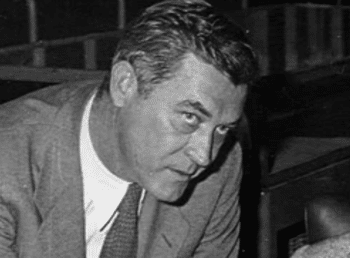
Michael Wilson [Source: findagrave.com]
Along with the Hollywood Heritage Museum’s Rudolph Valentino and Mary Pickford, et al., memorabilia, screenwriter/director Allison Burnett lent HHM historic Blacklist mementos exhibited in display cases to enhance the Legacy screening and panel. Ken Levy, son-in-law of screenwriter Robert Lees, who wrote comedies such as 1948’s Abbott and Costello Meet Frankenstein, gushed that the Museum’s sold-out show was “one of the best Blacklist events I’ve ever attended.”
In 2017, Levy co-organized the 70th anniversary commemoration of the Hollywood Blacklist at the Writers Guild Theater in Beverly Hills, which featured TV/movie actors and relatives of persecuted talents re-enacting blacklistees’ HUAC testimony (see: c-span.org).
Another relative of a purged screenwriter attending the Legacy program was Nancy Escher, daughter-in-law of Dalton Trumbo, who won an Academy Award using a pseudonym for 1956’s The Brave One and is widely acknowledged as the scribe who broke the Blacklist, when he received screen credits for 1960’s Exodus and Spartacus.
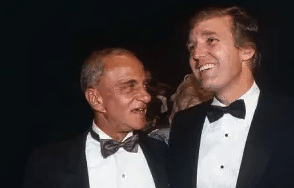
Roy Cohn and Donald Trump. [Source: vanityfair.com]
I am presenting the April 13-30 screenings of “The Hollywood Ten at 75” movies, which kicks off with a double feature of 1943 World War II morale boosters. Tender Comrade stars Ginger Rogers and is written and directed by two members of the Hollywood Ten: Dalton Trumbo and Edward Dmytryk.
The desert drama Sahara stars Bogie and was written by the first member of the Hollywood Ten to testify, John Howard Lawson, purported leader of the Hollywood branch of the Communist Party. Lawson’s granddaughters, Nancy Lawson Carcione and Andrea Lawson, will join me on the Academy Museum’s stage between the two movies for a discussion.
The West Coast debut of “Blacklist: The Hollywood Red Scare” is taking place May through September “at the Skirball Cultural Center with newly added artifacts, Blacklist: The Hollywood Red Scare shines a spotlight on the proceedings, investigations, motives, and choices of those caught in the crosshairs—including the many Jewish creatives and executives who suffered under and enforced the blacklist. The result is an emotionally complex and compelling exhibition that demonstrates how the politics of Hollywood can shape the entire country. The exhibition is organized by Jewish Museum Milwaukee,” according to the Skirball’s website.
The educational program includes online classes and screenings of Blacklist-related movies, such as 1973’s The Way We Were, starring Robert Redford and Barbra Streisand, and aims to “[e]xplore the history and impact of the Hollywood Red Scare and its contemporary implications for civil liberties, propaganda, and shifting definitions of American patriotism.”
In addition to these three Los Angeles museums, in October 2022 Turner Classic Movies presented “75th Anniversary of the Hollywood Blacklist” airing mostly vintage films for three weeks with a special theme highlighting what Hollywood Ten screenwriter Alvah Bessie called “the Inquisition in Eden.” During this dire period U.S. conservative cancel culture ran amok, weaponizing government to persecute those who were considered to be “woke” back in the 1940s and 1950s.
From the Salem witch trials to the Espionage and Sedition Acts to the House Un-American Activities Committee and beyond, the witch-hunters and inquisitors have always been among us.
On February 2, 2023, not 1953, the House of Representatives passed House Concurrent Resolution 9, “Denouncing the horrors of socialism,” with a 328 Yeas, 86 Nays and 14 Present vote, declaring: “Whereas the United States of America was founded on the belief in the sanctity of the individual, to which the collectivistic system of socialism in all of its forms is fundamentally and necessarily opposed: Now, therefore, be it resolved by the House of Representatives (the Senate concurring), That Congress denounces socialism in all its forms, and opposes the implementation of socialist policies in the United States of America.” On February 7, 2023, the Senate referred the resolution to the Judiciary Committee. (See: congress.gov)

[Source: imgflip.com]
Learning about yesterday’s anti-communist Reds-under-the-beds hysteria can empower people today to resist the rising tide of book banning, school curriculum gagging, censorship, disinformation, history denial, expulsions, red-baiting, Russophobia, war mongering and more. If we don’t, as Michael Wilson warned, we “may be doomed to replay it.”
For more info see:

